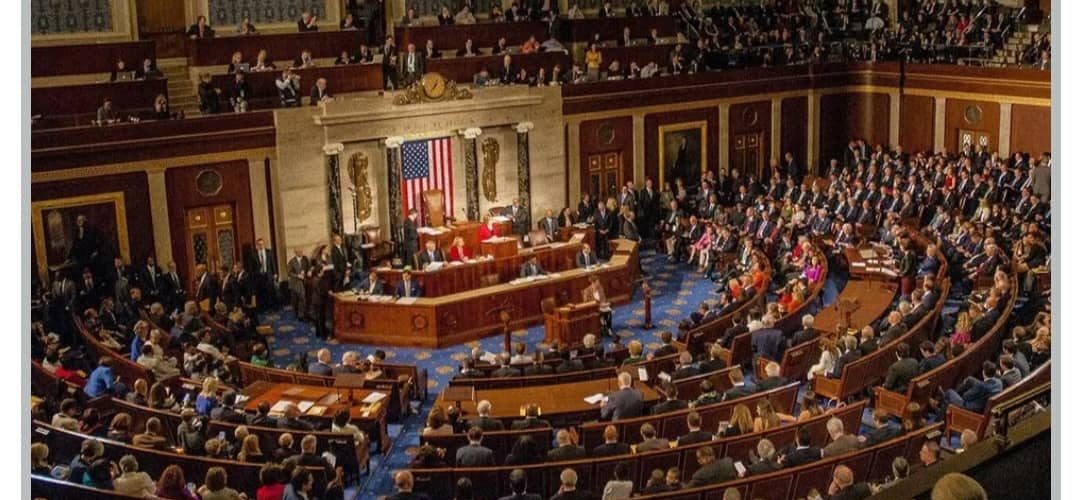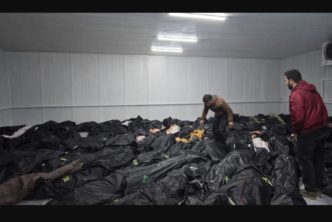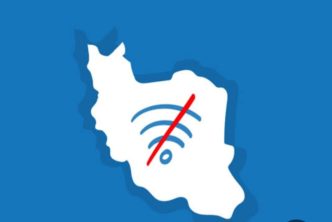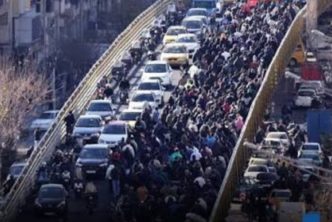Published in Sharq (page 12) and Etemad (pages 1 and 8) newspapers on Tuesday, 17th of Tir 1404 in Iran and a number of other news sites and publications
In the Name of God, Freedom, and Peace
Honorable Members of the United States Congress,
The signatories of this letter represent the views of a group of human rights defenders, political and civil activists, lawyers, journalists, and some academics and university professors from Iran, Europe, and the United States—individuals who are considered independent of the Iranian government.
On the eve of Prime Minister Netanyahu’s upcoming visit to the United States—which may once again drag the U.S. into a new war—we wish to remind you that during Israel’s 12-day assault, which was backed by the current U.S. administration, hundreds of civilians, including women and children, were killed. It is evident that the United States government, through its participation and overt support of this humanitarian catastrophe, bears both legal and moral responsibility before the conscience of the global public and in the face of the bloodshed of innocent victims—many of whom were Iranian women, children, and other noncombatant civilians.
You have sworn to uphold the ideals of America’s Founding Fathers, who stood for tolerance and peace. However, President Trump, in his support for Israel, launched an attack against a nation that, for over two centuries, had never initiated a war. In contrast, Israel’s regime—especially the far-right government under Netanyahu in the past two years—has consistently pursued militaristic policies, state-sponsored violence, and organized terrorism. According to the International Court of Justice in The Hague, Israel has repeatedly and systematically committed serious violations of human rights, genocide, crimes against humanity, forced displacement, and the stripping of citizenship from the Palestinian people.
Over the past seven decades, Israel’s ruling authorities have not honored the 1967 peace accords or the Camp David and Oslo agreements. Their occupation of vast territories in Lebanon, Syria, Jordan, and Egypt, as well as the continued construction of settlements in Palestinian territories, stands in blatant defiance of numerous UN resolutions—repeatedly proving their non-compliance with international norms and their commitment to aggressive warfare.
In recent weeks, Israel, under the pretext of Iran’s imminent access to nuclear weapons, initiated a war. This claim not only contradicts reports by U.S. intelligence agencies but was also refuted by the Director General of the International Atomic Energy Agency during a Security Council session, who stated: “We have no evidence that Iran is pursuing a nuclear bomb.”
This war broke out amidst ongoing diplomatic negotiations between Iran and the United States—at a moment when prospects for a peaceful nuclear agreement seemed more promising than ever. Instead of moving toward diplomacy, the result was widespread destruction of residential areas, assassinations of senior military officials and scientists, and the killing of nearly a thousand Iranian civilians during 12 days of attacks—including the bombing of Evin Prison, which constitutes a clear example of a war crime. Regrettably, it must be noted that this horrifying conflict was officially acknowledged to have been premeditated. This admission by Israel’s government, later confirmed by senior Trump administration officials, shows that the diplomatic process lacked any sincerity.
U.S. political, financial, and military support for Israel over the past seventy years cannot be justified within the framework of America’s fundamental national interests or its strategic vision for Iran. Rather, it aligns directly with the Israeli government’s long-standing goal to overthrow the Iranian regime and break up the country. Such actions have severely undermined the U.S. Constitution’s legal authority and the moral standing of the American nation in the eyes of the global public. Therefore, we urge you, as elected representatives of the American people, not to allow a discredited and dangerous politician like Netanyahu to manipulate your country’s strategic vision or tarnish its international credibility.
It is deeply regrettable that this war has been waged under the false and unjustifiable doctrine of “preventive war,” a concept that contradicts the fundamental principles of law and justice. It aims not only to revise core tenets of liberal democracy but also to legitimize inhumane precedents in international law, and to lay the groundwork for militaristic, fascist, and racially discriminatory policies. For this reason, the undersigned, while affirming Iran’s sovereignty, territorial integrity, defense capability, and national security, expect that the U.S. Congress act as a symbol of peace and democracy, not as a supporter of Netanyahu—the most ruthless promoter of war, terrorism, violence, and widespread human rights violations since World War II.
We hereby warn that continued and extensive U.S. support for Netanyahu’s far-right government—if it results in the renewal of war and violent Israeli attacks on Iran—will profoundly damage America’s standing in global public opinion and leave scars deeper and more painful than the 1953 CIA-backed coup against Iran’s democratic government led by Prime Minister Mossadegh. Therefore, we urge you, the esteemed members of Congress, to use your legal authority to counter the neo-conservative and anti-democratic policies of the Trump administration and to leverage America’s political, economic, and military standing in the global order to prevent another destructive and terrifying war in the Middle East.
Instead, we call on you to help revive diplomacy and foster constructive cooperation in the Persian Gulf—an initiative that would serve the national interests of both the United States and Iran.
Statesmen and Political Activists
- Azar Mansouri (President of the Iranian Reformist Front and Secretary-General of the Union of Islamic Iran People Party)
- Mohammad Hossein Bani-Asadi (Secretary-General of the Freedom Movement of Iran and political prisoner after the revolution)
- Sadegh Nowrouzi (Secretary-General of the National Development Party of Iran)
- Mohammad Reza Khatami (Deputy Speaker of the Sixth Parliament and former Secretary-General of the Islamic Iran Participation Front)
- Javad Emam (Secretary-General of the Assembly of Devotees Party and political prisoner after the revoloutition)
- Mohsen Mirdamadi (Secretary-General of the Islamic Iran Participation Front and political prisoner after the revolution)
- Mahmoud Sadeghi (Secretary-General of the Islamic Association of University Lecturers and Tehran MP in the 10th Parliament)
- Habibollah Payman (Secretary-General of the Movement of Muslim Militants and political prisoner before and after the revolution)
- Shahindokht Molaverdi (Secretary-General of the Women’s Human Rights Party and former Vice President in the Rouhani administration)
- Tahereh Naghi’i (Secretary-General of the Iranian Teachers’ Organization and political convict)
- Tahmasb Vaziri (Head of the Political/Executive Board of the Organization of Iranian People’s Fedai Guerrillas – Majority Faction)
- Ahmad Montazeri (Chief of Staff to the late Grand Ayatollah Montazeri)
- Mohammad Tavassoli (Former Secretary-General of the Freedom Movement of Iran, political prisoner before and after the revolution)
- Morteza Alviri (Political prisoner before and after the revolution, and former Mayor of Tehran)
- Mohsen Armin (Member of the Sixth Parliament from Tehran, Head of the Political Bureau of the National Development Party, and Deputy Head of the Iranian Reformist Front)
- Feyzollah Arab-Sorkhi (Chair of the Executive Board of the National Development Party)
- Ali Shakourirad (Tehran MP, Deputy Speaker of the Sixth Parliament, and former Secretary-General of the Union of Islamic Iran People Party)
- Mohsen Safaei Farahani (Former head of the Football Federation, Deputy Minister of Economy in Khatami’s government, and political prisoner after the revolution)
- Mahmoud Mirlouhi (Executive Deputy Secretary-General of the Nation Party of Iran)
- Hossein Nourani-Nejad (Deputy Secretary of the Union of Islamic Iran People Party and political prisoner after the revolution)
- Mostafa Moein (Former Minister of Science and Higher Education during President Khatami’s administration, President of the Iranian Association of Ethics in Science and Technology, and retired University of Tehran professor)
- Abdollah Ramezan-Zadeh (Retired University of Tehran professor and government spokesperson during President Khatami’s administration)
- Ali Mohammad Hazeri (Deputy Secretary of the Islamic Association of University Lecturers and retired sociology professor at Tarbiat Modares University)
- Abdolali Bazargan (Senior member of the Freedom Movement of Iran and religious scholar)
- Mohammad Ali Ayazi (Senior Member of the Society of Seminary Scholars and Teachers of Qom and university professor)
- Davoud Soleymani (Head of the Political Bureau of the Islamic Association of University Lecturers, Tehran MP in the Sixth Parliament, and political prisoner after the revolution)
- Abolfazl Bazargan (Central Council Member and Head of the Political Bureau of the Freedom Movement of Iran)
- Ali-Asghar Khodayari (Political Deputy of the Union of Islamic Iran People Party)
- Hadi Khaniki (Communications professor at Allameh University, political and cultural activist, and Central Council member of the Union of Islamic Iran People Party)
- Alireza Rajaei (Member of the National-Religious Activists Council, editorial board member of Iran-e-Farda monthly, and political prisoner after the revolution)
- Parvaneh Salahshouri (Tehran MP in the 10th Parliament, political analyst and critic of the government)
- Mohsen Torkashvand (Central Council Member of the Assembly of Devotees Party and former member of the Sixth Parliament)
- Hossein Rafi’i (National-religious activist, political prisoner after the revolution, and retired university professor)
- Hashem Sabbaghian (Central Council Member of the Freedom Movement of Iran and former Minister of Interior under PM Mehdi Bazargan)
- Reza Sadr (Former Minister of Commerce in the Bazargan Cabinet and senior member of the Freedom Movement of Iran)
- Marziyeh Azarafza (Head of the Maam Institute for Civil Education)
- Ali Mazrouei (Journalist, political activist, and former MP)
- Rasoul Aramesh (Head of the Inspection Council of the Assembly of Devotees Party)
- Hamid Ahmadzadeh (Member of the Central Council of the Organization of Iranian People’s Fedai Guerrillas – Majority Faction)
- Hossein Ahmadi (Spokesperson and Central Council Member of the Assembly of Devotees Party)
- Abbas Ahmadi (Head of the Kurdistan Branch of the Assembly of Devotees Party)
- Morteza Saremi (Executive Board Chair of the Assembly of Devotees Party)
- Mehdi Kiani (Head of the Political Council of the Assembly of Devotees Party)
- Mehdi Mo’tamedi Mehr (Deputy Executive Chair of the Freedom Movement of Iran, political prisoner after the revolution)
Human Rights Defenders
- Emadeddin Baghi (University lecturer, founder of two human rights organizations—“Society for the Defense of Prisoners’ Rights” and “Defenders of the Right to Life”, recipient of four international human rights awards)
- Farideh Gheyrat (Human rights activist, Vice President of the Society for the Support of Prisoners, and former board member of the Iranian Bar Association)
- Saeed Khalili (Former judge and human rights lawyer)
- Manaf Ammari (Lawyer based in Norway)
Academics and University professors
- Mohammad Sahimi (Professor at the University of Southern California)
- Mohammad Reza Ziaei Bigdeli (Professor of International Law at Allameh Tabataba’i University)
- Mohammad Ataei (History professor, University of Massachusetts)
- Alireza Alavitabar (Researcher and retired university professor)
- Hassan Yousefi Eshkevari (Religious scholar based in Europe and former Member of the First Parliament after the 1979 Revolution)
- Hossein Kamali (Professor at the University of Hartford International)
- Dariush Mohammadpour (University professor based in Europe)
- Ali Tahmasbi (Researcher in culture and religions)
- Mohsen Masarrat (University professor – Berlin, Germany)
- Saeed Moidfar (Professor at the University of Tehran and President of the Iranian Sociological Association)
- Ali Asghar Mowlavi (University professor of medical physics and former President of Hakim Sabzevari University)
- Mansour Mirsaeedi (University professor and former Dean of the Faculty of Law at Allameh Tabataba’i University)
- Hadi Hadizadeh (Retired nuclear physics professor at Mashhad University and senior member of the Freedom Movement of Iran)
Journalists
- Masoud Behnoud (Writer and journalist)
- Mohammad Ghouchani (Editor-in-Chief of Agahi-No magazine)
- Mehdi Rahmanian (Editor-in-Chief of Sharq Newspaper)
- Akbar Montajabi (President of the Tehran Province Journalists’ Association and Editor-in-Chief of Sazandegi newspaper)
- Reza Tehrani (Editor-in-Chief of Kiyan magazine)
- Ali Izadi (Director of Andisheh youtube Network and resident of the UK)
- Mohammad Jafari (Former Editor-in-Chief of Enghelab-e-Eslami newspaper)
- Hamed Sahabi (Editorial board member and former Editor-in-Chief of Iran-e-Farda, political prisoner after the revolution)
- Amir-Mossadegh Katouzian (Journalist based in Europe)
- Lotfollah Meisami (Editor-in-Chief of Cheshmandaz-e-Iran, political prisoner during both the Pahlavi and Islamic Republic eras)





